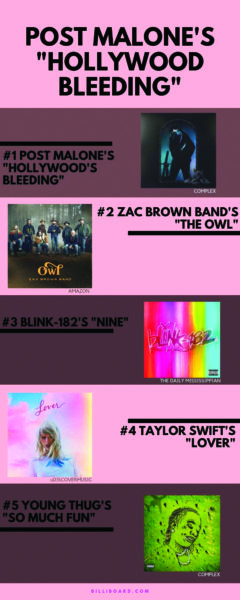
Post Malone released his third album on Sept. 6.
Reporting by Anoush Torounian

On Sept. 6, Post Malone released his third studio album, “Hollywood’s Bleeding,” which received critical acclaim for its dynamic elements and musicality. The album, currently number one on the Billboard 200, features a wide variety of artists including Halsey, Ozzy Osbourne, Travis Scott and SZA. This diversity in style and genre blend together, creating a congruous work of art that extends to a broad audience and marks a shift in the direction of the music industry as a whole.

Post Malone emerged into the world of mainstream music with his debut album “Stoney,” and has been successful ever since. His second album, “Beerbongs and Bentleys,” reigned on the Billboard 200 for three weeks. Although his music consistently carries a slow and steady beat, “Hollywood’s Bleeding” subtly diverges from his previous style.
“His first album that went mainstream was all rap,” said junior Ariel Tisthammer. “… and his lyrics have much more meaning now.”
This lyrical depth provides a glimpse into Post Malone’s humanity and vulnerability. The lyrics and melodies have a heartfelt element that make them relatable. His angst-filled ballad “Die for Me” reflects on the sorrow and frustration that comes with a tumultuous relationship, which many people have experienced: “said you’d take a bullet, told me you would die for me/I had a really bad feeling you’ve been lying to me.” The contrast and fusion between the musical styles of Future and Halsey, the two artists featured on this track, strangely works, and it works well. The track “Myself” wistfully paints a picture of the disconnect he feels within himself and his surroundings: “All the places I’ve been/I wish I could’ve been there myself.” Through his authenticity, he paves a pathway to his listeners.
This highlights Post Malone’s main appeal: relatability. His discordant and enigmatic physical appearance have been a long standing stamp of his public image, and many in his fanbase point out that he looks rich and poor at the same time.
Early on in his career, Post Malone rapped about possessions that he strove to acquire. His lyrics resonate with a wider audience than conventional rappers because while emotions are universal, material goods are not.
Of course, no album is perfect, and “Hollywood’s Bleeding” is no exception. The track “Saint Tropez” embodies the antithesis of the vulnerable and sensitive Post Malone revealed in other songs. He took on the tone of a stereotypical flexing rapper — “50 carats on (my) fist/I moneyball like Bradley Pitt/I’ll take ‘em all don’t matter what the price is” — ultimately detracting from his appeal. What some interpret as the album’s greatest strength may be interpreted as its greatest flaw — its versatility may be seen as a lack of direction rather than a deliberate stylistic choice.
Perhaps the best aspect of “Hollywood’s Bleeding” is the focus on conveying meaningful stories rather than materialistic whims that have dominated the industry for far too long. Hopefully, the success of Hollywood’s Bleeding inspires other artists to take on a similar approach.





